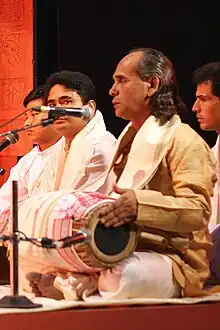
'Bayanacharya' Shri Ghanakanta Bora Muktiyar is one of the most eminent exponents and gurus of Sattriya dance, a major classical dance tradition of Assam, India.[1][2] He is also a renowned instrumentalist, choreographer and author. He has won the prestigious Sangeet Natak Akademi Award in 2001.[3]
Early life
Shri Bora was born in 1950 in Majuli. At the age of four, Shri Borah was brought to the Kamalabari Sattra in Majuli as a sattra inmate. At the age of six, the child Ghanakanta started receiving training in Sattriya dance and music from the great exponent of the Vaishnavite tradition, Late Maniram Dutta Muktiyar Barbayan. Another renowned exponent of the tradition, Shri Raseswar Saikia Barbayan, taught him Natya (art of dancing), Bayan (art of playing Khul/Mridanga) and Ojapali (dance style). Shri Ghanakanta completed his training with distinction at an early age and was elevated as Barbayan (one of the principal artists in the sattra) at a young age.[4]
Career
His career began at the Sattra itself when he was selected as an "Adhyapak" (Guru) to coach and train the young pupils in the sattra. When the Kamalabari Sattra was being shifted due to frequent flooding of the Brahmaputra River, Shri Raseswar Saikia Barbayan brought him along to Guwahati to showcase his emerging talent.
In 1971 he was appointed as the teacher of Sattriya dance at the Bishnupur Kala Kendra in Shillong. In 1974 he was appointed as a teacher of Sattriya Dance and Bhaona in Sanakardeva Cultural Institute in New Delhi which was established with the efforts of Late President Fakhruddin Ali Ahmed and Late Jogendra Nath Saikia, then Member of Parliament. He returned to Guwahati in 1975 and joined as a teacher of Sattriya dance when the Sangeet Sattra was established in Guwahati.
In 1980 Shri Bora joined the State Music College, Assam as a teacher of Sattriya Dance and currently is settled in Guwahati. In 1987, he started his own institute called Sattriya Kala Kendra to impart training on Sattriya. The school has produced a group of young and talented performing artists from all over the world.[2] Shri Bora has also established over 25 schools for training on Sattriya all over Assam.
Shri Bora has also performed extensively on various musical platforms, and festivals throughout the country.[5] Shri Bora recently performed Sattriya Dance and played the Khol in 'Bharat Mahatsova' held in South East Asia, including Malaysia, Indonesia and Australia. He has collaborated with the Spic Macay for the past 6–7 years. Shri Ghanakanta Bora has also authored two books on Sattriya Dance: (i) Mati Akhora and (ii) Khol Sikhsa.[2]
Awards and honours
He is currently the Head of the Department of Sattriya Music and Dance of the Government State College of Music, Assam. Apart from his associations with various cultural institutions, he is associated with the Project of Support to Sattriya Dance, and Dance Music, Sangeet Natak Akademi, New Delhi as "Guru" providing advanced training in Sattriya Dance and Khol. Shri Bora is also associated with a national level Sangeet Natak Akademi project called "Onkia Bhaauna – RaamBijoy Naat" in Brojavoli dialect.
He has been awarded the Padma Shri in 2013 by the Government of India in recognition of his distinguished contribution to Sattriya Dance.[6] In 2001, he was awarded the prestigious Sangeet Natak Akademi Award for his seminal contribution to Sattriya Dance.[3] He is also the Honorary Director of Maniram Dutta Muktiyar Sattriya Kala Kendra, Guwahati. Shri Bora is also a trustee of Srimanta Foundation for Culture and Society, Guwahati.
At the age of 15, he attained the title of 'Barbayan' at Majuli Sattra (The title of 'Barbayan' given by the Sattras is equivalent to the contemporary degree of Masters of Arts). In 2008, he was honoured with the title of "Bayanacharya" which is the highest honour given by a Sattra. Till date only two Sattriya Gurus have been honoured with the title of Bayanacharya – Late Maniram Dutta Muktiyar Barbayan and Shri Ghanakanta Bora.
References
- ↑ Sumathi, Saigan Connection. "Sattriya Dancers in Assam, India". Narthaki.com. Retrieved 3 October 2013.
- 1 2 3 "The Tribune, Chandigarh, India – Arts Tribune". Tribuneindia.com. 26 April 2002. Retrieved 3 October 2013.
- 1 2 "Archived copy". Archived from the original on 30 May 2018. Retrieved 11 May 2019.
{{cite web}}: CS1 maint: archived copy as title (link) - ↑ Ghanakanta Bora "Barbayan": Sattriya Sanskritir Otit Aru Bortomanor Xetu by Mrs. Dipali Dutta Bordoloi
- ↑ "Kids Portal for Parents – Site Map". 4to40. Archived from the original on 4 October 2013. Retrieved 3 October 2013.
- ↑ "Padma Awards" (PDF). Ministry of Home Affairs, Government of India. 2015. Archived from the original (PDF) on 15 October 2015. Retrieved 21 July 2015.